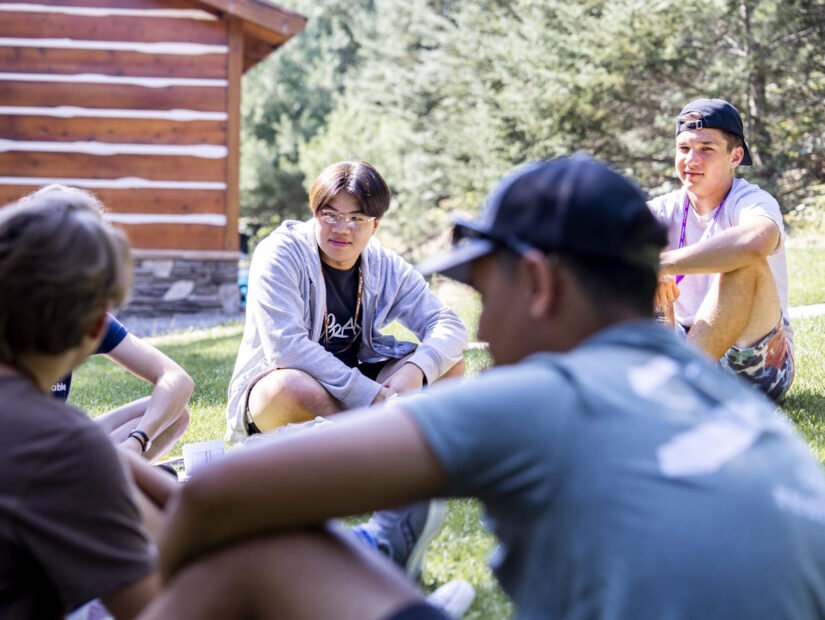“[Ascend] is a fresh perspective on how to train up young people to be resilient overcomers in the world, as well as a brave outlook on education. It has been one of the most challenging things [our son] has taken on, but he loves it.”


Modern higher education is failing young people.
It’s not just the thousands of dollars of debt that drag new graduates down. It’s not just the out-of-date teaching methods and principles.
The failure of modern higher ed goes beyond these because it fails to help students thrive holistically. It’s not just a financial or academic problem.
It’s a problem of purpose, community, and relevance.
How Modern Higher Ed Fails Students
Higher education fails to help students clarify and pursue their purpose because the only goals held out to young people are fame, fortune, and power. Even higher education exists largely to award degrees that exist to provide credentials for employment. The idea is that the better the degree or the more impressive the school, the richer the young person will end up to be.
Not only does this not follow naturally since building wealth is not dependent on academic credentials, it is a great misunderstanding of human purpose. Telling young people that their lives only find meaning in being rich, famous, or powerful is to misdirect them, lie to them, and set them up for frustration and despair.
The future of education in your inbox.
Get productivity tips, commentary, and Unbound updates sent to you!
In this culture of glamorizing fame, wealth, and power, young people are driven to live isolated lives that focus on achieving that fame, wealth, and power. When young people have nothing bigger than themselves to live for, it’s hardly a surprise that their lives are seldom connected in a real genuine community.
Without a sense of purpose and a community to live with, young adults face a life that is increasingly abstract and divorced from the real world and the responsibilities it brings. Therefore, a number of young people struggle to execute practical life skills and higher education doesn’t help much in reorienting young people to the real needs of the world they’ve been called to serve.
There are more problems with modern higher education philosophy. This is just the beginning. The goal is not to depress you or to simply complain about the state of higher education in our culture today.
An Inadequate Alternative
The feeling that higher education is failing our young adults is not a unique or isolated sentiment. Many young people are opting to skip traditional college altogether and jump immediately into the workforce.
But this strategy is not without its own downsides.
In a short-term perspective, working full-time out of high school makes more sense than attending college for many students. It offers immediate cash and real-world experience. In many cases, we would argue, this is more valuable than an academic credential.
However, as the years go on, it’s not hard to imagine many young adults who join the workforce and remain “stuck” in “dead-end” jobs. Remember, getting a job right out of high school won’t usually illuminate one’s purpose in life. Without this key element, confusion and stagnation are just as prevalent as with young people chasing academic credentials without further thought.
Purpose, clarity, and direction in life don’t just strike like a lightning bolt from the blue. Going to college by itself won’t elucidate the purpose of one’s life. Neither will working forty hours a week at an entry level job right out of high school. It’s something that only comes with some level of intentionality and mindful preparation.
Likewise, community doesn’t magically form around young adults who join the workforce. In fact, working a job can still lead to an isolated individual.
So, modern higher ed misses the mark in training young adults to thrive but simply joining the workforce is also inadequate.
A Better Solution
Young people need a solution that provides more than just academic training. They need a solution that provides a way to navigate big decisions about life purpose, a community that supports them, and practical life skills that they can use in the real world.
Enter Ascend.
Ascend is a project-based post-high school program that helps students thrive holistically by providing these things and more. Students are trained to own their purpose, build healthy relationships, and live resiliently for the glory of God by being extraordinary at ordinary life. They are taught to pursue excellence in every area of their lives and embrace the risk of doing something instead of holding back for fear of failure.
Sarah, the mother of one Ascend student said, “As I read about Ascend, I knew it was exactly what our son needed. He has thrived! It is a fresh perspective on how to train up young people to be resilient overcomers in the world, as well as a brave outlook on education. It has been one of the most challenging things [our son] has taken on, but he loves it.”
These words reveal the elements at the heart of the Ascend program: challenge, resilience, thriving.
Being a young adult is not an easy thing. But that’s not an excuse to do it poorly. Young adults are, after all, adults and they should live and train as such. Ascend avoids the pitfall of belittling young people’s responsibilities and also the pitfall of throwing them into life without adequate preparation and support.
How Ascend Helps Students Thrive
Ascend helps students work through questions about their purpose by offering highly actionable training on navigating forward through life decisions. Even if a student has “no idea” what they want to do, Ascend doesn’t let them opt-out of life for that reason. Instead, Ascend students receive guidance on how to take next steps and ultimately own their purpose.
Community doesn’t happen randomly for Ascend students. Living a “life of purpose” in isolation either leads to failure or narcissistic imbalance. We believe that much of the impact that one has in life comes from the relationships one develops. Building healthy relationships and communities is not a distraction from one’s purpose or work. It is actually a large part of it.
For this reason, Ascend is structured to provide maximum opportunity for developing community. Ascend is built on a series of live events that bring students together from all over the country. As they participate in this national “network”, students are also free to invest in their own local communities because of the location flexibility that Ascend offers.
At the root of thriving in the real world is the key Ascend principle that far better than wealth, fame, and power is the potential of impacting others by living ordinary lives in an extraordinary way.
Take note, however, that this doesn’t excuse or encourage being “ordinary”. Instead, it invites students to develop an attitude of mastery. It encourages excellence and the mastery of practical life skills.
This is best done through project-based education in Ascend. Students complete real world projects, learning practical skills, gaining resume-worthy experience, and reflecting on their experiences as they go.
As Sarah’s words above remind us: this isn’t easy. It’s a challenge. For Sarah’s son, launching into life with Ascend was “one of the most challenging things he has taken on.” But the reward is worth the investment. Preparing for life doesn’t have to end in isolation, drudgery, or confusion.
Are you ready to start your journey with Ascend? Click here to book a free consultation with our team to learn more about the program and confirm your student’s eligibility.


Ellie Smith is the VP of Sales and Operations for Unbound. She is a homeschool and Unbound graduate with a degree in Communications from Thomas Edison State University. In 2017 and 2018, she served on the Unbound National Student Cabinet as the Director of Sales and Marketing. In 2019, she traveled to Ecuador with Unbound’s mission team.
When Ellie isn’t working with our awesome students, she’s probably reading too many books at once, working on a graphic design or hand lettering project, or napping. Because naps are awesome. Her favorite meals are street tacos, popcorn, and coffee.

